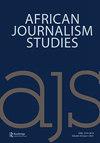公民记者作为解释性话语社群:津巴布韦AMH之声研究(2014-2018)
IF 1.8
3区 文学
Q3 COMMUNICATION
引用次数: 3
摘要
摘要本研究关注2014-2018年间津巴布韦AMH之声公民新闻和另类媒体平台上公民记者的新闻话语。这项研究的核心是努力证明津巴布韦的多层面危机如何支持公民新闻的出现,以及公民记者如何在平台上构建关于危机的替代政治叙事和反霸权话语。理论上的出发点是解释共同体。泽利泽(1993。“记者作为解释性群体”。《大众传播批判研究》10(3):219–237)观察到,当记者通过共同的话语和对关键公共事件的集体解释而团结在一起时,他们就会成为一个解释性群体。争论的焦点是,AMH之声是一个由公民记者组成的解释团体,受对危机的常见反霸权解释的约束。数据分析的方法论方法是批判性话语分析,这使研究人员能够调查公民新闻的含义、新兴主题和意识形态偏见。该研究表明,AMH之声的公民新闻话语大多以非主导视角构建,使用解释性新闻写作风格来表达另类政治叙事、挑战现状和倡导激进政治变革。阐释性写作风格突出了公民记者对危机的解读、观点和情感。本文章由计算机程序翻译,如有差异,请以英文原文为准。
Citizen Journalists as Interpretive Discourse Communities: A Study of AMH Voices in Zimbabwe (2014–2018)
ABSTRACT This study focuses on news discourses by citizen journalists at the citizen journalism and alternative media platform of AMH Voices in Zimbabwe between the years 2014–2018. Central to the study was an endeavour to demonstrate how the multidimensional crisis in Zimbabwe supported the emergence of citizen journalism and how citizen journalists constructed alternative political narratives and counterhegemonic discourses of the crisis on the platform. The theoretical point of departure is that of interpretive communities. Zelizer (1993. “Journalists as Interpretive Communities.” Critical Studies in Mass Communication 10 (3): 219–237) observes that journalists become an interpretive community when they are united through shared discourses and collective interpretations of key public events. The argument is that AMH Voices emerged as an interpretive community of citizen journalists bound by common counterhegemonic interpretations of the crisis. The methodological approach to data analysis was critical discourse analysis which allowed the researcher to investigate meanings, emerging themes and ideological bias of citizen journalism. The study established that citizen news discourses at AMH Voices were mostly framed in non-dominant perspectives using interpretive news writing styles to express alternative political narratives, challenge the status quo and advocate for radical political change. The interpretive writing style foregrounded the citizen journalists’ interpretations, opinions and emotions regarding the crisis.
求助全文
通过发布文献求助,成功后即可免费获取论文全文。
去求助
来源期刊

African Journalism Studies
COMMUNICATION-
CiteScore
1.90
自引率
10.00%
发文量
18
期刊介绍:
Accredited by the South African Department of Higher Education and Training for university research purposes African Journalism Studies subscribes to the Code of Best Practice for Peer Reviewed Scholarly Journals of the Academy of Science of South Africa. African Journalism Studies ( AJS) aims to contribute to the ongoing extension of the theories, methodologies and empirical data to under-researched areas of knowledge production, through its emphasis on African journalism studies within a broader, comparative perspective of the Global South. AJS strives for theoretical diversity and methodological inclusivity, by developing theoretical approaches and making critical interventions in global scholarly debates. The journal''s comparative and interdisciplinary approach is informed by the related fields of cultural and media studies, communication studies, African studies, politics, and sociology. The field of journalism studies is understood broadly, as including the practices, norms, value systems, frameworks of representation, audiences, platforms, industries, theories and power relations that relate to the production, consumption and study of journalism. A wide definition of journalism is used, which extends beyond news and current affairs to include digital and social media, documentary film and narrative non-fiction.
 求助内容:
求助内容: 应助结果提醒方式:
应助结果提醒方式:


